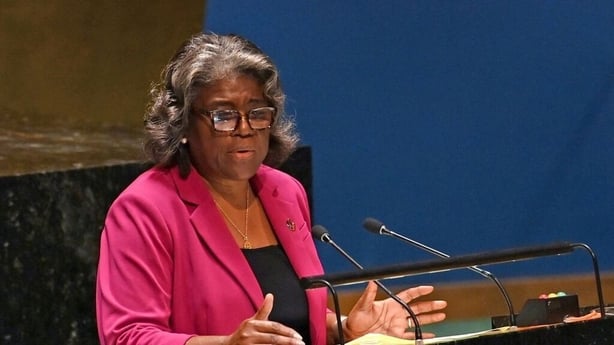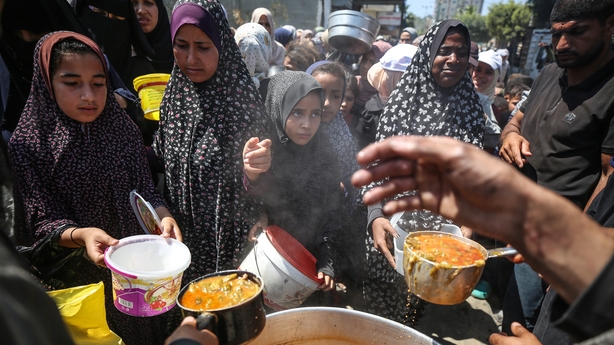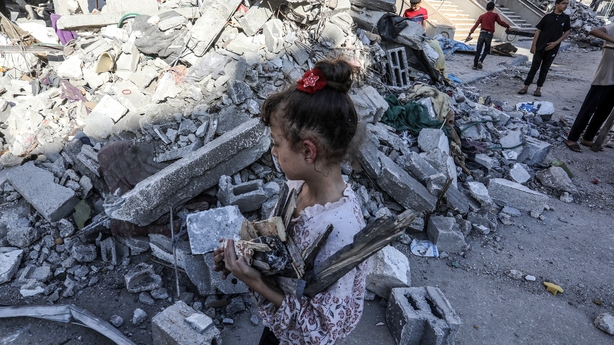The United Nations Security Council is scheduled to vote on Friday on a Palestinian request for full UN membership, diplomats have said, a move that Israel ally the US is expected to block because it would effectively recognize a Palestinian state.
The 15-member council is due to vote at 3pm local time (8pm Irish time) on Friday on a draft resolution that recommends to the 193-member UN General Assembly that "the state of Palestine be admitted to membership of the United Nations," diplomats said.
A council resolution needs at least nine votes in favour and no vetoes by the US, Britain, France, Russia or China to pass.
Diplomats say the measure could have the support of up to 13 council members, which would force the US to use its veto.
Council member Algeria, which put forward the draft resolution, had requested a vote for tomorrow afternoon to coincide with a Security Council meeting on the Middle East, which is expected to be attended by several ministers.

The US has said that establishing an independent Palestinian state should happen through direct negotiations between the parties and not at the UN.
"We do not see that doing a resolution in the Security Council will necessarily get us to a place where we can find ... a two-state solution moving forward," US Ambassador to the UN Linda Thomas-Greenfield said today.
The Palestinians are currently a non-member observer state, a de facto recognition of statehood that was granted by the 193-member UN General Assembly in 2012.
But an application to become a full UN member needs to be approved by the Security Council and then at least two-thirds of the General Assembly.
The UN Security Council has long endorsed a vision of two states living side by side within secure and recognized borders.
Palestinians want a state in the West Bank, east Jerusalem and Gaza, all territory captured by Israel in 1967.
Little progress has been made on achieving Palestinian statehood since the signing of the Oslo Accords between Israel and the Palestinian Authority in the early 1990s.
The Palestinian push for full UN membership comes six months into a war between Israel and Palestinian Hamas militants in Gaza, and as Israel is expanding settlements in the occupied West Bank.
Appeal for €2.6bn Palestinian aid
Earlier, the UN appealed for $2.8bn (€2.6bn) in funding to assist more than three million people in Gaza and the West Bank until the end of the year, to help ease food shortages and prevent looming famine in Gaza.
A flash appeal published by the UN Office for the Coordination of Humanitarian Affairs (OCHA) said that sum was needed to help 3.1 million people and "reduce human suffering and prevent further loss of life."
A major chunk of funding - $782.1m - will be destined for food aid for 2.2 million people in Gaza and 400,000 people in the West Bank, the appeal said.
More than six months of war have created critical food shortages among Gaza's population that in some areas now exceed famine levels, according to the United Nations.
A senior UN aid official said yesterday that the United Nations was struggling to prevent famine in Gaza and while there had been some improvement in coordination with Israel, aid deliveries in the territory still faced obstacles.

OCHA chief Andrea De Domenico said aid deliveries within Gaza were facing significant checkpoint delays and that last week 41% of UN requests to deliver aid to northern Gaza were denied.
"We're dealing with this dance where we do one step forward, two steps backward, or two steps forward, one step backward, which leaves us basically always at the same point," Mr De Domenico told reporters.
"For every new opportunity that we've been given, we will find yet another challenge to deal with," he said. "So it's really, really difficult for us to scale up to where we would like to be."
The UN has long complained of obstacles to getting aid in and distributing it throughout Gaza. But global outrage at the humanitarian crisis in the enclave of 2.3 million people escalated after Israeli airstrikes on 1 April killed World Central Kitchen aid workers.
Israel has since approved reopening the Erez crossing into northern Gaza and temporary use of Ashdod port in southern Israel after US President Joe Biden demanded steps to alleviate the humanitarian crisis in Gaza, saying conditions could be placed on US support for Israel if it did not act.

"There has been a steady increase of the number of trucks that have entered," said Mr De Domenico, adding that the UN did not know how many private aid deliveries Israel had allowed into northern Gaza. But he said the focus also needed to be on improving aid access within Gaza.
"The problem is it's not just about food. The problem is that famine is much more complex ... it's much bigger than simply bringing in flour," he said. "Water, sanitation and health are fundamental to curb famine."
US officials have noted steady progress in the amount of aid that goes into Gaza, the US State Department said, but it was still not at the desired level and Washington was working to improve that.
Israel is retaliating against Hamas in Gaza over the 7 October attack on Israel by the Palestinian militant group, saying they killed some 1,200 people and took more than 250 people hostage.
Gaza health authorities say Israel has killed more than 33,000 people in Gaza since 7 October.

